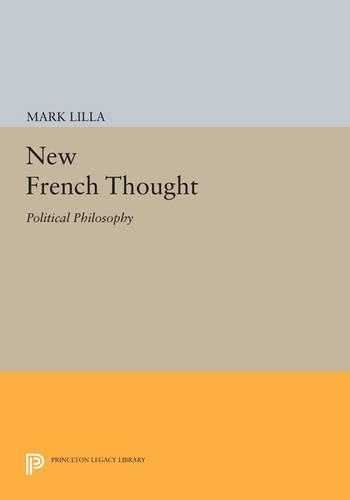
New French Thought: Political Philosophy
(Paperback)
Available Formats
Publishing Details
New French Thought: Political Philosophy
By (Author) Mark Lilla
Princeton University Press
Princeton University Press
23rd September 2014
United States
Classifications
Tertiary Education
Non Fiction
320.01
Physical Properties
Paperback
252
Width 178mm, Height 254mm
425g
Description
The past fifteen years in France have seen a remarkable flourishing of new work in political philosophy. This anthology brings into English for the first time essays by some of the best young French political thinkers writing today, including Marcel Gauchet, Pierre Manent, Luc Ferry, and Alain Renaut. The central theme of these essays is liberal de
Reviews
"After World War II, most French intellectuals dismissed liberalism and pluralism... Since around 1980, however, several younger philosophers have thought liberalism worthy of renewed attention, and Lilla's anthology ably presents a selection of their views... a useful anthology."--Library Journal "In this volume, Luc Ferry, Alain Renaut, Blandine Kriegel and Stephane Rials defend human rights against the charge that "rights" are merely assertions of will or political power... Another welcome feature of French liberalism today is its willingness to reflect on the actual workings of a liberal society. Here Gilles Lipovetsky, Anne Godignon, Jean-Louis Thiriet and Pierre Manent offer especially compelling insights... New French Thought makes clear how much the intellectual climate in Paris has changed for the better."--Harvey Mansfield, Wall Street Journal "As Lilla suggests in a fine introduction, French thinkers are now considering issues they have neglected for years: human rights, modern individualism, the nature of liberalism--subjects which have obsessed their British and American counterparts for years. This volume may be just the thing to start an entente cordiale between Anglophone and Continental philosophers."--The Guardian "This excellent volume brings together the writings of the younger generation of French writers and intellectuals ... who for virtually the first time have accepted the legitimacy of liberal democracy as a political order."--Foreign Affairs
